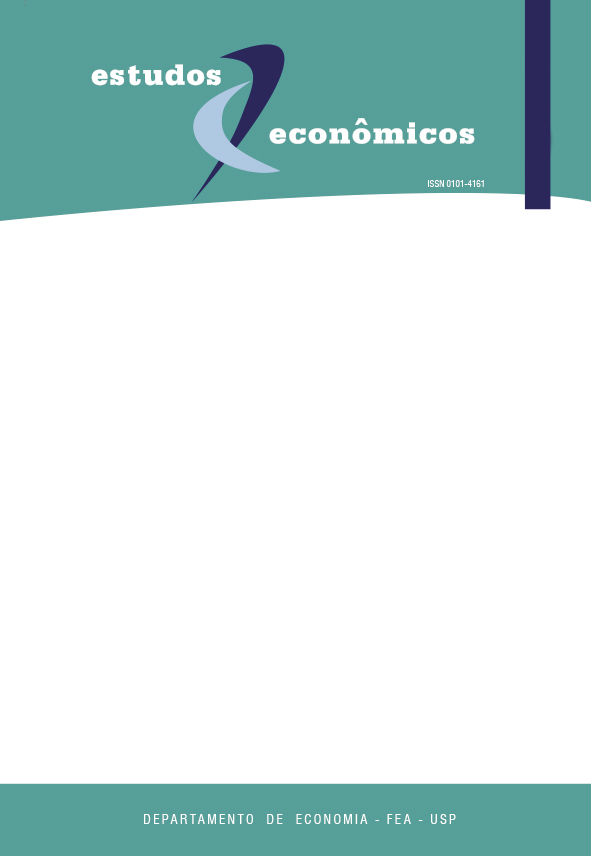Políticas de precificação do setor de saneamento urbano no Brasil: as evidências do equilíbrio de baixo nível
DOI:
https://doi.org/10.1590/S0101-41612005000300004Palavras-chave:
saneamento, política de preços, regulação, equilíbrio de baixo nívelResumo
O artigo analisa a existência do Equilíbrio de Baixo Nível no setor de saneamento urbano brasileiro, de acordo com o modelo de Spiller e Savedoff (1999). Neste tipo de equilíbrio existe um círculo vicioso entre o oportunismo do governo, preços abaixo dos custos de fornecimento, ausência de investimentos e a baixa qualidade dos serviços de utilidade pública. A exemplo de outros países da América Latina, os resultados demonstram que, com poucas exceções, a qualidade dos serviços de abastecimento urbano de água e de esgotamento sanitário no Brasil é de baixo nível. Este resultado está associado ao modelo ins-titucional e regulatório adotado. No entanto, as particularidades no caso brasileiro deixam mais evidente que o baixo nível está também associado às condições econômicas, uma vez que os estados e municípios de maior renda possuem serviços de alta qualidade, independentemente do sistema regulatório.Downloads
Referências
ARTANA, D. et alii. Governance and regulation: a tale of two concessions in Argentina.
In: SAVEDOFF, W. D.; SPILLER, P. T., Spilled water: institutional commitment in the provision of water services. Washington, D. C.: Inter American Development Bank, 1999.
EMERCIANO, E.; BALTAR, L. A. Flexibilização institucional da prestação de serviços
de saneamento: implicações e desafios. Acqua-Plan – Estudos, Projetos e Consultoria. Brasília: Ministério do Planejamento e Orçamento. Secretaria de Política Urbana. IPEA, 1995. (Série Modernização do Setor Saneamento,3).
HOLANDA, N. C. et alii. Regulação da prestação de serviços de saneamento: análise
comparada da legislação internacional. NH Consultoria e Planejamento.
Brasília: Ministério do Planejamento e Orçamento. Secretaria de Política Urbana/ IPEA, 1995, 278 p. (Série Modernização do Setor Saneamento, 6).
LEVY, B.; SPILLER, P. T. The institutional foundations of regulatory commitment: a comparative analysis of five country studies of telecommunications regulation. Journal of Law, Economics, and Organization, v. 10, n. 2, p. 201-46, 1994.
MÉNARD, C.; SHIRLEY, M. Reforming Public utilities: lessons from urban systems in six developing countries. Anais do II Seminário Brasileiro da Nova Economia Institucional, Campinas: Unicamp, 2001.
MORANDÉ, F.; DOÑA, J. E. Governance and regulation in Chile: fragmentation of the public water sector. In: SAVEDOFF, W. D.; SPILLER, P. T., Spilled
water: institutional commitment in the provision of water services. Washington, D. C.: Inter American Development Bank, 1999.
MUELLER, B.; PEREIRA, C. Credibility and the design of regulatory agencies in Brazil. Brazílian Journal of Political Economy, v. 22, n. 3 (87), p. 65-88, julysept. 2001.
OZUMA, T. J.; GÓMEZ, I. A. Governance and regulation: decentralization in Mexico’s water sector. In: SAVEDOFF, W. D.; SPILLER, P. T., Spilled water: institutional commitment in the provision of water services. Washington, D. C.: Inter American Development Bank, 1999.
PEREIRA, D. S. P.; BALTAR, L. A. A.; ABICALIL, M. T. Saneamento: modernização e parceria com o setor privado. Brasília: Ministério do Planejamento e Orçamento. Secretaria de Política Urbana/IPEA, 1995 (Série Modernização do Setor Saneamento, 9).
REZENDE, F. et alii. Novo modelo de financiamento para o setor saneamento. Brasília:
Ministério do Planejamento e Orçamento. Secretaria de Política Urbana/IPEA, 1995, 204 p. (Série Modernização do Setor saneamento, 2).
SHIRLEY, M.; XU, L. C. Information, incentives and commitment: an empirical
analysis of contracts between government and state enterprises. Word Bank Paper 1976. Washington, DC., 1996.
SILVA, R. T. Fundamentos e proposta de ordenamento institucional. Núcleo de Pesquisas
em Informações Urbanas da Universidade de São Paulo – INFURB.
Brasília: Ministério do Planejamento e Orçamento. Secretaria de Política Urbana/
IPEA, 1995a (Série de Modernização do Setor Saneamento,1).
SILVA, J. A. C. Diagnóstico do setor de saneamento: estudo econômico e financeiro.
Aliança - Pesquisa e Desenvolvimento. Brasília: Ministério do Planejamento e Orçamento. Secretaria de Política Urbana/IPEA, 1995b. 251p. (Série Modernização do Setor Saneamento, v. 4).
SPILLER, P. T.; SAVEDOFF, W. D. Government opportunism and the provision of water. In: SAVEDOF, W. D.; SPILLER, P. T., Spilled water: institutional
commitment in the provision of water services. Washington, D. C.: Inter American Development Bank, 1999.
TAMAYO, G. et alii. Reform efforts and low-level equilibrium in the Peruvian water sector. In: SAVEDOF, W. D.; SPILLER, P. T., Spilled water: institutional commitment in the provision of water services. Washington, D. C.: Inter American Development Bank, 1999.
WALKER, I. et alii. Reform efforts and low-level equilibrium in the Honduran water
sector. In: SAVEDOFF, W. D.; SPILLER, P. T., Spilled water: institutional commitment in the provision of water services. Washington, D. C.: Inter American Development Bank, 1999.
Downloads
Publicado
Edição
Seção
Licença
Copyright (c) 2005 Ricardo Coelho de Faria, Jorge Madeira Nogueira, Bernardo Mueller

Este trabalho está licenciado sob uma licença Creative Commons Attribution-NonCommercial 4.0 International License.
A submissão de artigo autoriza sua publicação e implica o compromisso de que o mesmo material não esteja sendo submetido a outro periódico.
A revista não paga direitos autorais aos autores dos artigos publicados.





 Atualizado em 14/08/2025
Atualizado em 14/08/2025